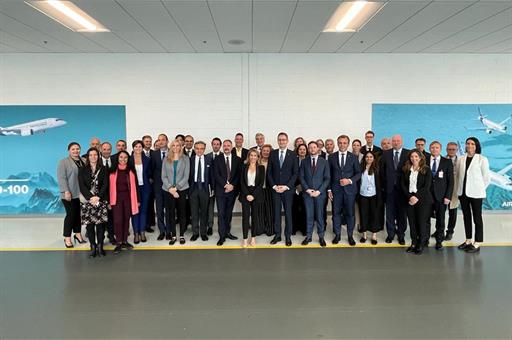Raquel Sanchez visits Airbus plant in Canada and supports joint statement to boost industrial cooperation and decarbonise aviation
News - 2022.9.27
Minister Raquel Sánchez visited the Airbus facilities in Mirabel (Quebec) together with her counterparts from France and the Netherlands, the German Secretary of State, the Canadian Minister for Economic Development for the Quebec Regions, the European Commission's Director General for Mobility, Henrik Hololei, and the company's CEO in Canada, Benoît Schultz.
Airbus CEO Guillaume Faury took part in the meeting by videoconference and supported a joint declaration of support for industrial cooperation, the recovery of the sector after COVID-19 and the promotion of measures to reduce greenhouse gas emissions.
During the tour of the A220 assembly line, the minister congratulated the aeronautical manufacturer on its commitment to protecting the environment, stressing the importance of European and international industrial collaboration and of joining forces to reduce greenhouse gas emissions in the aviation sector. To this effect, the strategic role of Airbus in the Spanish aeronautical industry is notable, with several plants and centres in Andalusia, Castilla La Mancha or Madrid, as is its confirmed willingness to increase its commitment to R&D in strategic programmes for the future in Spain related to the reduction of emissions and subsequent decarbonisation of aviation.
"Airbus is a clear example of international cooperation and the consolidation of excellent relations between European and Canadian industry. It is also a magnificent model of the European industry's firm commitment to protecting the environment, as demonstrated by the tireless work it has been carrying out to achieve more sustainable and environmentally friendly aviation", said Raquel Sánchez, before going on to recall that the 41st ICAO Assembly, which begins today, is the setting for debating and deciding on the objectives for the coming years in terms of reducing greenhouse gases in air transport.
"This is an exceptional opportunity for Canadian and European representatives to join forces and collaborate to achieve ambitious goals, and to send out an unequivocal signal to the world of our commitment to the environment and an important endorsement of the efforts that our aeronautical industry has been making," said the minister hours before speaking at the afternoon session of the ICAO Assembly on behalf of Spain.
Joint declaration
As already mentioned, the visit was followed by the joint declaration with the European manufacturer, which was supported by Henrik Hololei, Director General for Mobility of the European Commission; Raquel Sánchez, Spanish Minister for Transport, Mobility and Urban Agenda: Clément Beaune, Minister Delegate for Transport of France; Stefan Schnorr, State Secretary at the Ministry of Digitalisation and Transport of Germany; Mark Harbers, Minister for Infrastructure and Water Management of the Netherlands; the Minister for Sport; and the Minister responsible for the Canadian Economic Development Agency for the Quebec regions, Pascal st-Onge.
The following principles are especially supported:
- Supporting the aviation industry and the recovery of air transport worldwide in the aftermath of the COVID-19 crisis.
- Underlining the importance of the presence of Airbus in Canada and of the A220 programme, and confirming the willingness of all parties to continue the current partnership.
- Highlighting the need for aviation to contribute to the fight against climate change and, consequently, for the 41st ICAO Assembly to agree on a net zero emissions LTAG (Long Term Aspirational Goal) by 2050, while also confirming the importance of CORSIA.
- Paying tribute to the commitment of Airbus and its industrial partners to the decarbonisation of aviation and calling on the industry to further mobilise in this endeavour in close dialogue with the authorities.
- Agreeing to explore the strengthening of public-private cooperation to decarbonise aviation, focusing on the development of new technologies to help reduce emissions and on increasing the production and uptake of sustainable aviation fuels.
Non official translation





